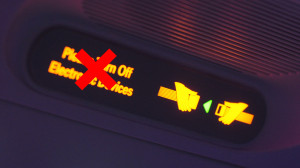 As the announcement to switch off our phones is broadcast. I watch some people settle back in their seats content or smug, they have complied. Some will discover upon landing that their phone wasn’t actually off! In fact the Airline Passenger Experience Association and the Consumer Electronics Association found 30 percent of passengers accidentally left an electronic device turned on during a flight -61 percent said it was a smartphone.
As the announcement to switch off our phones is broadcast. I watch some people settle back in their seats content or smug, they have complied. Some will discover upon landing that their phone wasn’t actually off! In fact the Airline Passenger Experience Association and the Consumer Electronics Association found 30 percent of passengers accidentally left an electronic device turned on during a flight -61 percent said it was a smartphone.
Another group will get up and check in a panic, only to find they have indeed already switched their phone off. On a recent flight, a woman in my row chastised me for taking too long to switch the phone off. We hadn’t left the gate yet so I am not sure we would have had a major crash landing.
And a small group deliberately leave their phones on, even surreptitiously checking their messages, email and Facebook as the plane taxies and takes off. I have witnessed some extreme examples of people hiding their live phone screens from the airline crew. It kind of amuses me because if the phone indeed interfered with the aircraft navigation systems, then hiding it from the staff won’t stop the plane from going down.
Some people conclusively state that they don’t really believe their smartphone, tablet, kindle or iPad is going to interfere with equipment. One friend of mine said recently I find it hard to believe that any critical safety issue would be left up to an honour system
So are we in danger?
In the early 1960s, an FM radio was blamed for an incorrect off-course indication.
A Crossair Saab 340B aircraft (Flight LX498) crashed two minutes after takeoff from Zuruch killing all seven passengers and three crewmembers on 10 January 2000. While the offiial cause was pilot error, it was noted that the autopilot system malfunctioned at the same moment that an SMS was recieved by one passenger’s cell phone and another received a call.
The British Civil Aviation Authority in 2002 found that a mobile phone, when used near the cockpit, will exceed safety levels for several pieces of equipment.
in March 2003, the captain of a Boeing 737 on instrument approach to Baltimore-Washington International Airport one night reported that his course indicator, which had been centered during the approach, suddenly showed a full deflection. The aircraft, flying on autopilot, moved off course, by one mile. The pilot concluded that one or more passengers had placed calls on their cell phones.
Studies by NASA concluded that passengers’ personal electronic equipment produce electromagnetic radiation which could impact the safety margins for critical on board systems. They note anecdotal evidence from cabin crew regarding cell phone interference.
No study, however, has found definitive evidence of a link between electronic equipment and significant on-board interference. There are some who suggest, that the issue is not a handful of devices left powered on but what happens when a 100 plus devices are being simultaneously used for surfing, chatting and texting?
In the absence of hard evidence either way, most air authorities globally, have taken a cautious approach stating that some electronic devices must be turned off whenever an aircraft is below 10,000 feet to “lessen the possibility of interference” during takeoff and landing. Carriers are to explain to the public the reasons for the prohibition.
In December 6 last year, Julius Genachowski, the then Chair of Federal Communications Commission wrote to the
FAA (Federal Aviation Administration) supporting a lifting of the ban saying such devices “They empower people to stay informed and connected with friends and family, and they enable both large and small businesses to be more productive and efficient, helping drive economic growth and boost US competitiveness…. I write to urge the FAA to enable greater use of tablets, e-readers and other portable electronic devices during flight, consistent with public safety,”
A few days later, On December 11, United States Senator Claire McCaskill, sent a letter to the FAA. noting that the public was “growing increasingly skeptical of prohibitions” on devices on planes. In the letter, she says: “I urge the agency to embrace the expanded use of PEDs and work to revise the necessary regulations that will allow for the use of laptop computers, e-readers, smartphones and other PEDs during the full duration of a flight.”
She concludes by saying she was “prepared to pursue legislative solutions should progress be made too slowly.”
In September, 2013, an industry-labour committee will provide recommendations to the FAA on whether the bans on cell phone usage should be lifted. Other authorities around the world will presumably follow the FAA lead. It will be interesting to see the outcome. It could mean the end of silence on many plane flights as people reach for their phones during takeoff and landing. I do dread a flight with several hundred people shouting into their mouthpieces!
In summary, the evidence of a link between electronics and potential danger seems slight. The authorities are concerned there is a risk, though. Whatever, the findings in the future, when you are asked to switch your phone off by crew, just do it. The time to make a civil rights stand over your right to talk to your partner, colleagues, client or financiers is not at that point. On a plane, we are required to follow crew instructions. They are in charge. I am not sympathetic to my plane being delayed by your “right” to make a call and I am not excited by placing a video of you being removed from the plane for disobeying crew orders!
Where do you stand?


I want the FAA to keep the ban because I simply could not stand being on a plane for several hours with 100 other people talking on their cell phones the entire trip. No way.
Agree with Gizmosdad. Keep the ban, but not because it makes me feel any safer.
I would say airplane mode is good enough for me..no need to power the device off
Agree with all above. I don’t want people talking excessively during my flights, but I also don’t see how devices on airplane mode transmit any signals similar to those mentioned in the incidents above.
Totally agree with the above. I would go further and urge someone to invent a device which can tell airline staff if someone’s phone is on when it’s not supposed to be and confiscate them if necessary. The safety issue has not been resolved; in fact, as mentioned, there have been crashes which seem to implicate phones. How dare anyone endanger my life. Also, I would have to ask to change seats if the person next to me was allowed to use their phone all through the flight, it would drive me mental. If the human race managed to survive in the days pre-mobiles, I don’t see why they can’t cope now
There’s a distinction between cell phones/email and other electronic devices. I’m fine if they take more time and do more studies before allowing cell phone usage, but I’ve never seen anything that says a Kindle with wireless turned off or an iPad in airplane mode or playing a iPod causes any interference. That’s way too far a stretch and they shouldn’t be banned for as much as an hour on flights sometimes (it’s often a half hour or more at peak times from gate closing to waiting for take-off to 10,000 feet, plus they make you shut it off 20 minutes or so before landing).
flying in and out of Pakistan and India multiple times, it’s hugely prevalent the usage of cellphones during take off and landing, and the lack of turning these off. I’ve seen and heard flight staff shouting at passengers during landing to stop using their phones (several people at the same time) only to be ignored. Given that I know this happens on a regular basis I’m not particularly worried but will at least be respectful myself and follow the rules. For June above, I doubt many flights would take off in this part of the world if your rules were implemented – they’d fight staff, or ignore them, turn phones off then on again…!